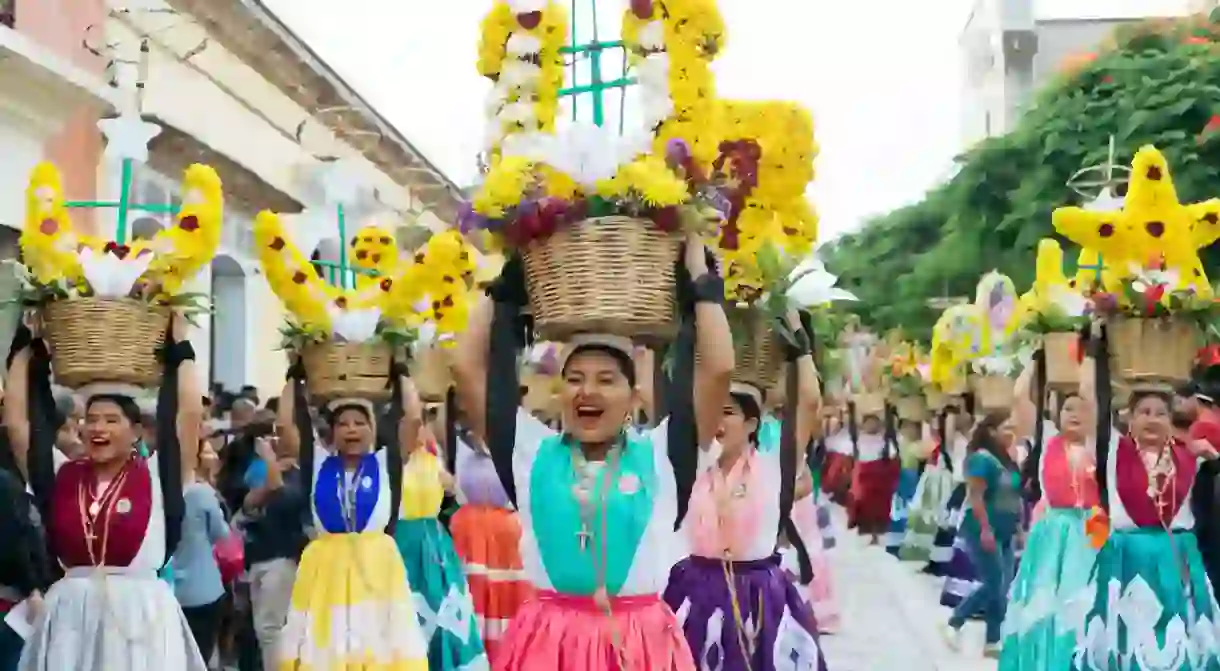A Closer Look at the Guelaguetza Dances in Mexico

Dance keeps the ancient culture of giving alive in Oaxaca.
The best festival in Mexico
It’s no secret that the Guelaguetza festival is one of the most popular celebrations in the Mexican Republic. This traditional festivity held in July can only be defined as a clash of cultures, since it mixes indigenous heritage with Catholic influences. The Guelaguetza dances, plays and offerings originally honored Centéotl, the goddess of maize, but after the Spanish conquest, it also became a way to commemorate the Virgin of El Carmen.


Nowadays, the Guelaguetza is mainly seen as a celebration of the state of Oaxaca and its culture. Every year, thousands of participants from all over the region gather together to represent their state through different shows. For two weeks, visitors can enjoy a variety of concerts, parades and gastronomic fairs that showcase Oaxacan legacy. However, the most important performances of the festivity are, undoubtedly, the Guelaguetza dances.


The Guelaguetza through the eyes of a dancer
Dancing is a serious matter during the Guelaguetza, and only the best performers can be part of the show. Months before the celebration, a special group, called the Committee of Authenticity, select the delegations that will participate in the festival. The choreography, the costumes, the originality and the natural ability of the dancers are only a few elements that the committee takes into account when selecting the performers.


Angélica Mariana Nuñez Banuet Vázquez has participated in the Guelaguetza dances for five years, and she is proud of being part of the show. “My favorite part about the whole two weeks of Guelaguetza is Lunes del Cerro, which is what we do on both Mondays: two dance shows of around 20 groups per day, in the morning and afternoon.”


However, although Angélica enjoys dancing, she also thinks performances are much more than just a form of entertainment. “Guelaguetza means ‘to give’, or ‘gift’, in the Zapotec language, so that is what it should literally be to every person: to unite, to become one, to party together, to enjoy the gathering and activities around this festival.”


As a way to reinforce the meaning of Guelaguetza, dancers also throw presents like chocolate, fruit and other traditional products to the audience. These small acts of kindness help performers bond with the spectators and communicate the essence of Oaxacan culture.


Angélica also sees the Guelaguetza dances as a way to remember the past. Oaxaca is the Mexican state with the largest indigenous population, so the festivity is the perfect platform to bring exposure to these ethnic groups. “The people that come from all over have a firm belief in the roots of our ancestors, and push for it to remain as culturally intact as possible. I believe that we the citizens have a right to keep our identity as sons and daughters of various indigenous cultures,” she says.


The Guelaguetza dances: Oaxaca’s storytellers
Although the Guelaguetza dances are very pleasing to the eye, the truth is that their beauty goes beyond aesthetics. These performances are also a way to tell stories about the people of Oaxaca, so, in a way, they are half a dance and half a play.


The Feather Dance, for example, or Danza de la Pluma, is one of the most emblematic shows of the festival. This performance retells the story of the Spanish conquest over the Aztecs in a very colorful and folkloric way. Likewise, the Torito Serrano recreates a bullfighting scene in which a female dancer represents the bull and the male dancer symbolizes a torero.


Be mesmerized by the Chinas Oaxaquenas
However, there is a show that deserves a special mention among all the Guelaguetza dances, and that’s the one by the Chinas Oaxaqueñas. This female dance group is in charge of welcoming all the guests to the festival and transmitting happiness and joy to the people. Locals say that you can identify them by their big smiles and the huge baskets they carry on top of their heads filled with sweets, bread, food and many other typical products of Oaxaca. The colorful women are famous for performing different Guelaguetza dances, but the most emblematic one is the Jarabe del Valle, which is supposed to animate the audience.


Heritage
The Chinas Oaxaqueñas represent the women of the region, and they honor the old traditions. A big part of this role depends on their attire, which has become iconic. According to Angélica, their costumes are a way of showing their heritage: “Chinas Oaxaqueñas’ wear is based on extensive research by Ramsés Mateos Alonso on how women native to Oaxaca city neighborhoods dressed more than 100 years ago. Each fabric is very specific to adorn the details in each garment, as is the type of jewelry, the way to dress your hair, and the type of makeup. Everything is kept within tradition as pristine as possible.”


Centuries of tradition
The Guelaguetza dances are an explosion of Mexican culture and a glimpse into the past. And, more than anything, they are also a medium to keep alive a tradition with hundreds of years of history. So, if you are traveling to this incredible state in July, don’t miss the chance to witness the festival. Additionally, you can also take the time to explore the city and visit some of its legendary markets and museums. Together, with the Guelaguetza, they guarantee the ultimate Oaxacan experience.


Did you know – Culture Trip now does bookable, small-group trips? Pick from authentic, immersive Epic Trips, compact and action-packed Mini Trips and sparkling, expansive Sailing Trips.













